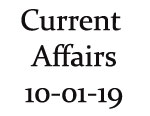-
Current Affairs 10th January 2019
Updated : 10-Jan-2019
Current Affairs 10th January 2019 - Important Points
- Global Aviation Summit with theme ‘Flying for All’ to be held from - 15th January 2019 onwards
- Gita Gopinath becomes the first female chief economist of - IMF
- UGC approves journals for Consortium for Academic & Research Ethics- CARE
- Government approves around 5000 additional seats in - Jawahar Navodaya Vidyalayas
- Single-usable plastic products banned by - Airports Authority of India
Current Affairs 10th January 2019 - Details
Global Aviation Summit with theme ‘Flying for All’ to be held from - 15th January 2019 onwards
In a first, Global Aviation Summit 2019 with the subject ‘Flying for all’ will be held by the Ministry of Civil Aviation in association with FICCI from January 15-16th, 2019 in Mumbai, India. The summit is backed by International Civil Aviation Organization, Federal Aviation Administration of United States, International Air Transport Association, Civil Air Navigation Services Organisation, Airports Council International & Association of Asia Pacific Airlines.
ObjectiveThe Summit goals to emphasis on the celebration of “Flying for All” & to deliver a platform to the aviation fraternity to present the challenges of the sector in the newly developing growth areas & understand how the technology-driven innovations will transform the air travel in future.
The Summit also goals to be the most comprehensive platform for civil aviation, observing a vivid representation from the global aviation ecosystem involving global leaders from airlines, producers, investors, sellers, cargo, space industry, banks, skill development agencies & states as well as UTs of India.
Important Points- The 2-day summit will host a conference, expo & will endeavour expressive engagements via G2G, G2B, B2B meetings & other networking openings.
- The platform will bring together projecting leaders from worldwide to share their experiences on firming national aviation ecosystems.
- Protruding transport ministers worldwide would be sharing their experiences on upgrading the Aviation ecosystem & put forth crucial analytical inputs on their success stories, experience & knowledge to progress aviation in their respective nations.
- The civil aviation authorities of the world will also deliberate how to ensure that safety & security norms are preserved across a fast-growing & vast aviation ecosystem.
- The programme will also study the future of drones, sustainable growth of aviation, cargo & logistics in the aviation industry, all the aspects behind structuring great aviation business.
- Above 1000 delegates from global aviation society are anticipated to take part in 1st of its kind Global Aviation summit 2019.
Gita Gopinath becomes the first female chief economist of - IMF
Gita Gopinath has united International Monetary Fund as its Chief Economist. She is the 1st female to grab the position of Chief Economist of International Monetary Fund and became the 11th Chief Economist of the International Monetary Fund.
She was born in Mysore, and holds a degree in B.A. from Lady Shri Ram College for Women, University of Delhi in 1992, Masters in economics from Delhi School of Economics, University of Delhi in 1994. She also accomplished her M.A. at the University of Washington 1996. In 2001, she finished her PhD
at Princeton University.Role of Chief Economist of IMF
- The Chief Economist of International Monetary Fund is also the Director of the Fund’s Research
Department which is accountable for providing independent advice to the Fund on its policy matters, integrating thoughts of the research in the design of policies, passing on these ideas to the policymakers inside & outside the fund & managing all research accomplished at International Monetary Fund. - The Chief Economist is part of the senior leadership team of the International Monetary Fund & directly advises the MD.
- The Chief Economist also leads about 100-PhD economists in the Research Department.
More about Gita Gopinath - Gita Gopinath is an Indian-American Economist.
- Earlier to her current role as the Chief Economist of International Monetary Fund, she was working as the John Zwaanstra Professor of International Studies & Economics at Harvard University.
UGC approves journals for Consortium for Academic & Research Ethics- CARE
The UGC has sanctioned the list of journals for the ‘CARE Reference List of Quality Journals’. The
Consortium for Academic & Research Ethics- CARE, is tasked to scrutinise & then accumulate a list of journals for social sciences, humanities, language, arts, culture, Indian Knowledge system and many more.
Consortium for Academic & Research EthicsUniversity Grants Commission had formed Consortium for Academic & Research Ethics to make a ‘CARE Reference List of Quality Journals’. The Consortium would form a list of ‘credible quality journals’ that would eventually replace University Grants Commission’s own list of journals.
The Consortium would be led by the University Grants Commission Vice Chairman & would consist of government bodies & statutory councils.
Need for the Consortium- A research paper headed by Professor Bhushan Patwardhan had studied that 88 percent of 1009
journals suggested by universities & consisted in the white list were dubious & only 112 journals fitted into the criteria set by University Grants Commission to be encompassed in the list. - This high instance of the dubious journals had unfavourably impacted the image of University Grants Commission & as well as India at the international stage.
- Hence the University Grants Commission had declared the formation of Consortium for Academic & Research Ethics to scrutinise & then compile a list of quality journals.
Government approves around 5000 additional seats in - Jawahar Navodaya Vidyalayas
The Union Minister of Human Resource Development Prakash Javadekar has declared an upsurge of
about 5000 seats at Jawahar Navodaya Vidyalayas across the nation. This is the biggest-ever expansion
& the number of seats has raised from 46600 to 51000 at the Jawahar Navodaya Vidyalayas.
Reason behind increasing seats- The upsurge in the number of seats was part of the government efforts to upsurge the access to quality education for the student, especially from rural areas.
- Over the time there has been an upsurge in the number of students smearing for the examination to get admitted in the Jawahar Navodaya Vidyalayas. The number of candidates raised from 5.50 lakh
applicants in 2001 to 31.10 lakh applicants in 2019. - The upsurge in the number of candidates reflects the growing applicants of rural children for acquiring quality education.
- Hence the government has increased the number of seats to deliver more opportunity for talented children from rural areas to receive a quality education in the closely free of cost residential schools.
Jawahar Navodaya Vidyalayas
JNVs were formed under the provisions of National Policy on Education in 1986. The Jawahar Navodaya Vidyalayas were formed to nurture & deliver opportunities for children with special talent and to progress at a faster pace by making good quality education available to them irrespective of their paying capacity.
Single-usable plastic products banned by - Airports Authority of India
The Airports Authority of India has banned the single-usable plastic products at its 129 airports across
the nation. The Airports Authority of India has started numerous steps including prohibition of single-
usable plastic products like straws, plastic cutlery, plastic plates and many more.
The Airports Authority of India has already acknowledged 16 of its airports as ‘Single-Usable Plastic
Free’ based on the 3rd-party assessment completed by Quality Council of India.
More about Single-usable plastics- Single-usable plastic products are utilised only once before they are thrown away/recycled.
- Petroleum-based plastic is non-biodegradable & usually goes into a landfill where it is buried/thrown into the water & finds its way into the ocean. They decay into tiny particles after many years.
- In this process of breakdown, they release toxic chemicals which eventually enter into our food & water supply system.
Airports Authority of India - The AAI was established under the Airports Authority of India Act, 1994. The AAI came into effect
being on 1 April 1995. - The Airports Authority of India was formed as a single Organization commended with the accountability of creating, upgrading, maintaining & handling civil aviation infrastructure both on the ground & airspace in the nation by amalgamating erstwhile National Airports Authority & International Airports Authority of India.














